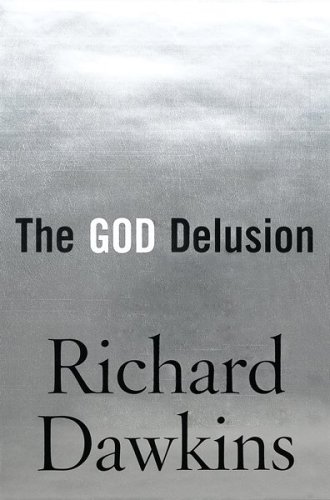 Just a few quick thoughts while I'm in the middle (pg 155) of reading Dawkin's The God Delusion; I like biology! Wow! And the cosmology stuff the Dawkin's just finished delving into, seriously, my son's favorite book to read at night one about the universe and it was freaky cool to suddenly have a few more interesting tidbits of information to impress my kindergartner with.
Just a few quick thoughts while I'm in the middle (pg 155) of reading Dawkin's The God Delusion; I like biology! Wow! And the cosmology stuff the Dawkin's just finished delving into, seriously, my son's favorite book to read at night one about the universe and it was freaky cool to suddenly have a few more interesting tidbits of information to impress my kindergartner with.But when Dawkins gets into the scientific proofs about why God could absolutely not exist (ie, a being so complex as to have 'created' the universe is even more highly improbable and raises more questions than the creation of that universe in the first place and the problems with declaring God un-research-able and outside the realm of science etc etc etc ...) he sort of loses me. And I'm trying to figure out why.
Maybe it's because I see how absolutely futile his arguments would be, say, in a dinner table discussion with my family? Or maybe it's because I still have my own lingering theist/deist biases that continue color my thinking? Or maybe it's connected to Dawkin's tendency to be a bit dismissive of believers (believers making up the vast majority of my friends and family). Perhaps it's because my own loss of belief in God went through an entirely different route than pure scientific rational inquiry. Still thinking on it. And enjoying the read in the meantime.
Anyhoo... random but related, while doing a bit of reading for my last post I stumbled upon Answers in Genesis (a website Dawkins references several times in his book) and did a good amount of eye-rolling as they try to pander to a female base by raging against Darwin's sexism, because Christians are ALL about equality of the sexes, so poo poo to you Darwin. Yah. Whatever.


6 comments:
Just ordered this book. I'm looking forward to reading it. I wonder how I will respond to it...
I no longer have really any friends who are religious (though certainly not all are atheists). As for family members, either they're non-religious as well or extremely orthodox Mormons. I actually agree with Dawkins a lot on the subject of religion in that I too believe that anything good that religion can show also exists outside of it and untainted by faith which, when defined as belief without any rational, logical, or observable basis or support, is a universal negative.
Teaching about science is unfortunately intrinsicly linked to also having to criticise religion because of how anti-science and anti-reality religion is. And I do believe that religion is, at its core, antithetical to science because it claims to promote a way of "knowing" that exists irrelevant of all observable reality and the scientific method.
I too lost my faith in gods/religion apart from scientific inquiry (more for emotional reasons), but once I did lose faith, I was able to then become far more scientifically and rationally minded.
Like Dawkins, I believe that atheism is the only reasonable position to have on the issue of the supernatural/gods. Anything else is just pointless conjecture.
What he means that god is outside the realm of science is basically what I was saying above - if god isn't directly observable, if his supposed actions can also be attributed to natural causes, and there is nothing which requires a theistic/supernatural explanation where there isn't a better, more simple, observable natural/real explanation, then god/s are pointless. Nothing they supposedly ever do or have done have had any observable effect on reality, ever. And indeed, most theists claim that to be how the are supposed to work, trying to weasel out of the fact that they simply have NO actual (scientific, repeatable, observed, peer-reviewed) evidence for a single one of their ridiculous claims.
Also what I remember from reading the book about a year ago, he doesn't really say god(s) absolutely can't exist, but as you point out, that the likelihood is so infinitesimally small so as to make it effectively zero, but to say it is absolutely impossible isn't quite accurate or possible to say.
I have one of Dawkins's books on my shelf, but I haven't read it yet. I think I agree with his ideas about religion, but I don't like his militant manner. I don't feel a need to proselytize my atheism any more than I did a need to proselytize my religion before leaving it.
But reading your review, maybe I'll pull that book from the shelf, dust it off, and give it a read.
I trust your opinion :)
I enjoyed listening to it... he and his wife do the narration and provide a nice one-two punch. While I felt through much of the book that he wasn't addressing my way of believing, occasionally he would have some strong points that I could chew on for a while. For that I appreciated the book. For the slam of fundamentalist religion (e.g. Answers in Genesis) I often found myself agreeing with him, which was kinda weird, because his tone definitely comes across as aggressive... All in all, a good read, because if we open our minds we can learn so dang much from people who push our buttons. So I suppose I appreciate Dawkins for what I can learn about myself through his stuff, not just for his mind.
A.J. Jacobs' "Year of Living Biblically" is pretty good too, imho, if you haven't read it--about an atheist Jew who spends a year trying to live every teaching in the Bible, and at the end describes himself not as a believer, but as a "reverent agnostic."
I've been watching lots of his interviews, I like that he has a cause.
I didn't mean that in a trite way. I'm really glad he's getting his voice out there. I'm glad he's addressing these beliefs. I don't know what I think about it all fully as I'm still in an agnostic phase myself...but I like that he's calling some of the religious zealots on their assumptions.
Post a Comment